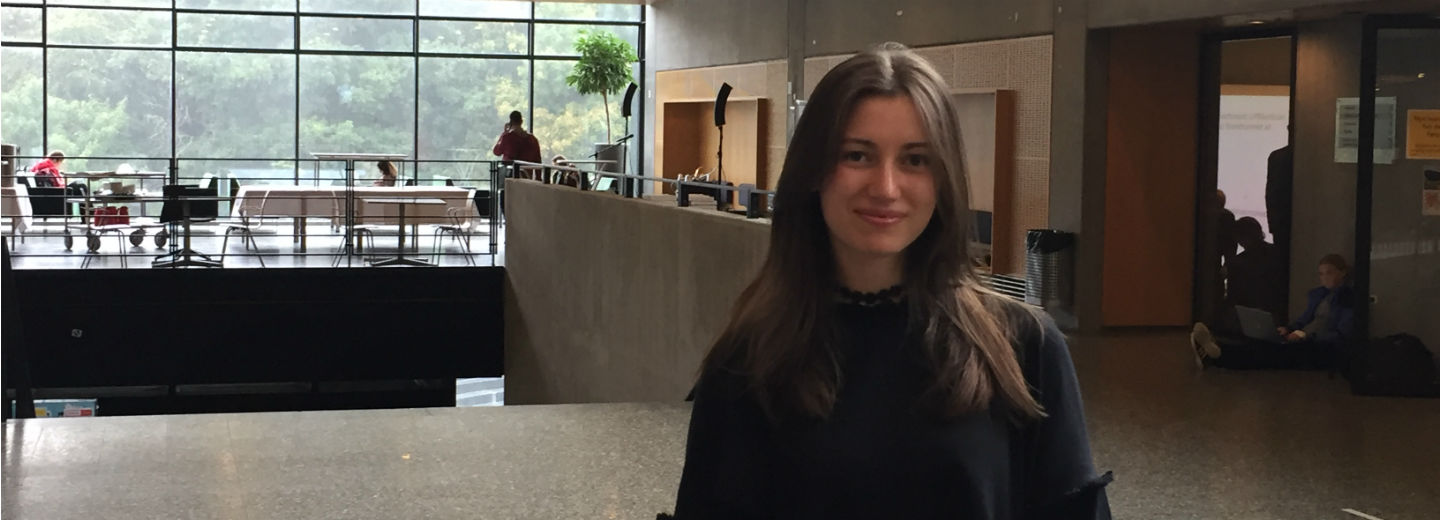
From Pharmacy in Riga to Medical chemistry in Odense
Marija Ciba has only been in Denmark for two weeks when she agrees to be interviewed about what it is like to be an international full-degree Master student at SDU.
By Tina Larsen
The 23-year-old Latvian had just completed her Bachelor in Pharmacy before the summer and also managed to work briefly as a pharmacist before she came to Denmark:
"My boyfriend is Norwegian, and he was studying medicine in Riga. He wanted to come to Denmark and complete the last part of his studies here, and I decided to come with him. I've also got some friends who study in Denmark, and they've spoken very highly about it. I think it's very worthwhile to come to a different country to study because it adds a bit of substance to my CV, which I can use later in my career. I'm really looking forward to spending the next two years in Odense," says Marija about the background for her decision.
Arrival in Denmark
On her arrival in Denmark, Marija was met by her buddy Claudio Mattera, an Italian PhD student at SDU:
"My buddy was very welcoming, and it has been a great help to have him around for the first couple of weeks. Claudio helped me with things like finding my apartment on the first day. I'm really happy with where I'm living. It's a great location. It's central in Odense and also relatively close to the University, which I'm pleased about. I share the kitchen and bathroom with other international students, and it turns out that there are actually four other students from Latvia living there - although I didn't know them from before. Sometimes it's a small world! Overall, ESN's welcome package has been really good, and I've already been on a walking tour of Odense arranged by them," says Marija about her first days in Denmark.
When Marija is asked about what is most challenging about being in Denmark, she very quickly mentions the weather:
"I don't like the rain. I want to cycle while I'm living in Denmark (because that's what you do here), but I wish it didn't rain as much. In Latvia, we mostly take the car or the bus, so cycling is something quite new for me," admits Marija.
First impressions of the study programme
Marija is studying Medical chemistry, which is an interdisciplinary Master programme in the cross field between chemistry and pharmacy. The programme is offered by FKF:
"I think the programme looks promising. The first couple of weeks have been a bit hard for me because I've had to find my feet with the courses- the physics courses in particular are difficult. Luckily, I can already feel that it's getting easier and easier, so I'm glad about that. The way of teaching here, where there is real equality between the teachers and students, really appeals to me. In Latvia, you would always address the teacher as Professor and then their last name, but in Denmark you just use their first name. I'll need to get used to that, but I think it's a good thing," adds Marija with a smile.
Marija is taking six different courses this autumn, so she will have plenty to do. However, she does not seem to be daunted and has already singled out the spectroscopy course as one of her favourites. She looks forward to getting into the laboratory soon, as so far she has mainly had classroom teaching:
"I'm pretty excited about the teaching methods here in Denmark. In Latvia, students aren't asked to read that much themselves. Instead, we learn from the slides the teachers use. It might be due to the students' poor English skills, which prompts the teachers to translate for us. It means that as a student you don't learn as much on your own, but in Denmark it seems to be the opposite. The students here read the books themselves and then the teaching is based on that, which works really well for me," concludes Marija.
Marija intends to learn Danish or Norwegian while she is in Denmark since she plans to live in one of the Scandinavian countries. Otherwise, she will spend time going to the gym, travel around Denmark and Europe, go to the cinema, meet up with friends and visit Odense concert hall.
This year, the intake of the Master’s programmes at the Faculty of Science is 151 Master’s students of which 35 are international students (please note that the numbers only include the fall intake, and thus the winter intake is not included).